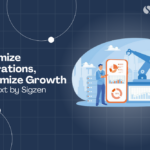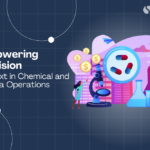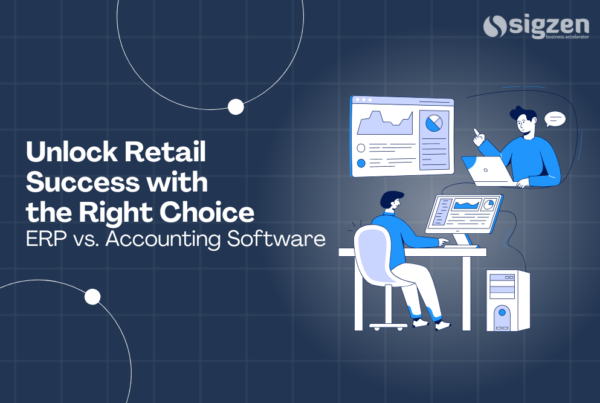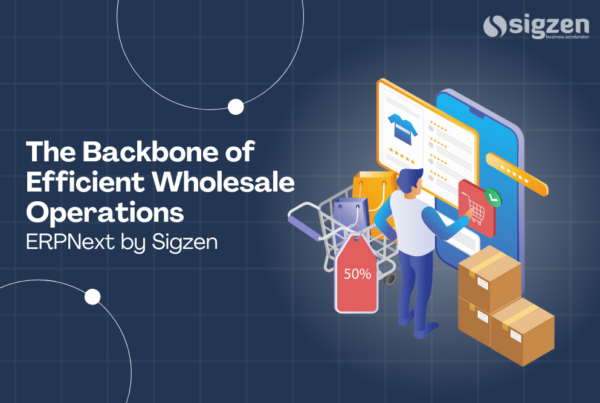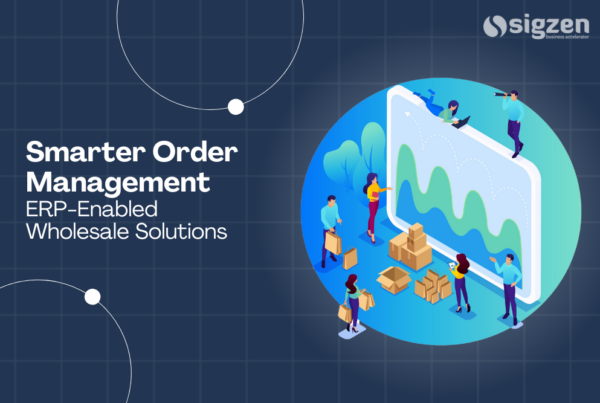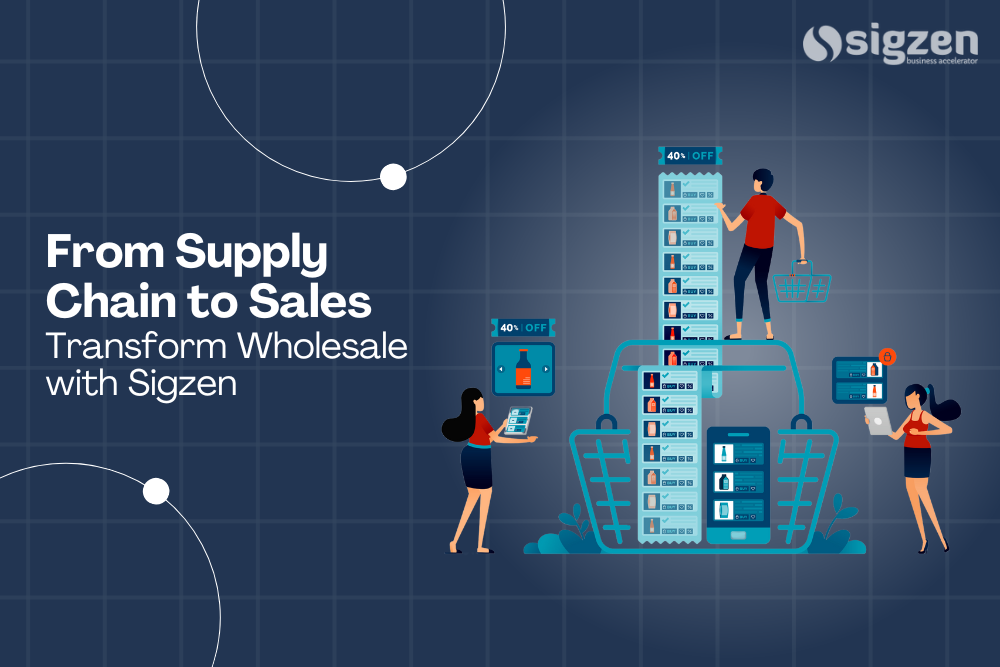
Introduction: Transforming Wholesale Operations with ERPNext
Managing a wholesale business involves juggling a complex array of processes, from inventory management to advanced scheduling and purchasing. Without the right tools, inefficiencies can creep in, affecting profitability and growth. This is where ERP for Wholesale comes in—a tailored solution designed to streamline operations and unlock new opportunities.
ERPNext by Sigzen Technologies stands out as a comprehensive platform for managing wholesale operations. With features like purchase requisitions, advanced planning and scheduling, and seamless integration across departments, ERPNext empowers wholesale businesses to achieve efficiency, scalability, and long-term success. In this article, we delve into how ERPNext transforms wholesale operations, exploring its benefits and features.
Challenges in Wholesale Business Management
1. Complex Inventory Management
Wholesale businesses often manage large volumes of stock across multiple locations. Ensuring real-time inventory updates is critical to avoid overstocking or stockouts.
2. Demand Forecasting
Accurately predicting customer demand is essential for efficient purchasing and inventory management, especially during peak seasons.
3. Streamlining Purchase Requisitions
Manual processes for managing purchase requisitions can lead to delays, errors, and missed opportunities for cost savings.
4. Scheduling Challenges
Coordinating deliveries, supplier schedules, and workforce availability requires robust planning tools.
5. Data Silos
Disconnected systems for inventory, sales, and finance hinder real-time visibility and decision-making.
How ERPNext Solves Wholesale Business Challenges
1. Centralized Inventory Management
ERPNext offers advanced stock inventory management software for real-time inventory tracking and control:
- Multi-Warehouse Management: Manage inventory across multiple locations with centralized oversight.
- Batch and Serial Tracking: Ensure traceability and compliance with regulatory requirements.
- Automated Stock Replenishment: Set reorder levels to prevent stockouts and maintain optimal inventory levels.
Learn more about ERPNext’s inventory management capabilities.
2. Advanced Planning and Scheduling for Wholesale
Efficient planning is vital for wholesale operations. ERPNext simplifies scheduling with:
- Demand Forecasting: Use historical data and analytics to predict customer demand and align procurement.
- Delivery Scheduling: Coordinate deliveries with precision to minimize delays and optimize logistics.
- Resource Allocation: Assign tasks and resources based on availability and priority.
3. Streamlined Purchase Requisitions
ERPNext automates purchase requisitions to save time and reduce errors:
- Approval Workflows: Implement customizable workflows for purchase approvals.
- Vendor Management: Track vendor performance and streamline supplier relationships.
- Automated Procurement: Generate purchase orders based on inventory levels and demand forecasts.
Explore purchase requisitions in ERPNext.
4. Integration with Sales and Finance
ERPNext bridges the gap between sales, inventory, and finance, ensuring smooth operations:
- Sales Order Management: Track orders in real-time and integrate them with inventory and delivery schedules.
- ERP Accounting Features: Automate bookkeeping, tax calculations, and financial reporting for better financial management.
- Data Synchronization: Eliminate data silos with integrated modules for seamless information flow.
Discover ERPNext’s sales and finance features.
5. Scalability for Growing Wholesale Businesses
Whether you’re a small business or a large enterprise, ERPNext grows with your business:
- Manufacturing Software for Small Business: Cost-effective solutions for smaller wholesalers.
- Enterprise Features: Advanced analytics, AI-powered insights, and automation for larger operations.
Benefits of ERP for Wholesale Business
1. Improved Operational Efficiency
Automate manual tasks, streamline workflows, and reduce human errors across the supply chain.
2. Enhanced Customer Satisfaction
Deliver products on time with real-time tracking and efficient logistics management.
3. Cost Savings
Optimize inventory levels, reduce wastage, and negotiate better vendor contracts with accurate data.
4. Data-Driven Decisions
Use real-time analytics and reports to identify trends, forecast demand, and improve decision-making.
5. Increased Scalability
Support business growth by managing higher volumes of inventory, sales, and customer relationships.
Key Features of ERPNext for Wholesale Business
1. Comprehensive Dashboards
Get a unified view of inventory, sales, and financial performance on customizable dashboards.
2. Role-Based Access Control
Assign roles and permissions to team members for secure and efficient workflow management.
3. Multi-Currency and Multi-Language Support
Conduct global business seamlessly with support for multiple currencies and languages.
4. Cloud-Based Accessibility
Access ERPNext features from any device, enabling on-the-go management.
5. AI and Automation
Leverage AI-driven insights and automation to enhance productivity and reduce operational overhead.
Real-World Impact: ERPNext in Wholesale
Challenge: A mid-sized wholesale distributor struggled with inventory inaccuracies, delayed deliveries, and inefficient purchase requisitions.
Solution: Sigzen implemented ERPNext, resulting in:
- 30% reduction in inventory costs through real-time tracking and automated reordering.
- 40% faster procurement processes with streamlined purchase requisitions.
- Enhanced customer satisfaction due to timely deliveries and improved order accuracy.
Request a demo from Sigzen to see ERPNext in action.
Future Trends in Wholesale Business with ERPNext
1. AI-Powered Demand Forecasting
Use AI and machine learning to predict demand patterns and align inventory and procurement accordingly.
2. IoT Integration
Monitor stock conditions in real-time with IoT-enabled sensors and integrate data into ERPNext.
3. Blockchain for Supply Chain Transparency
Enhance traceability and trust with blockchain-powered features for tracking goods and verifying authenticity.
4. Sustainability Tracking
Implement eco-friendly practices and track carbon footprints using ERP tools.
Best Practices for Implementing ERPNext in Wholesale
- Define Objectives: Identify key challenges and desired outcomes to align ERPNext implementation with your goals.
- Data Preparation: Organize and clean existing data to ensure a smooth migration process.
- Employee Training: Provide training sessions to familiarize employees with ERPNext features and functionalities.
- Monitor KPIs: Track key performance indicators like inventory turnover, order accuracy, and customer satisfaction to measure success.
- Partner with Experts: Work with experienced providers like Sigzen for a seamless ERP implementation process.
Conclusion: Unlock Efficiency and Growth with ERPNext for Wholesale Business
Running a successful wholesale business requires streamlined operations, accurate data, and efficient resource management. ERP for Wholesale, powered by ERPNext, offers a comprehensive solution to address these needs. With features like purchase requisitions, advanced planning and scheduling, and integrated sales and finance, ERPNext empowers businesses to scale efficiently and achieve sustainable growth.
Ready to transform your wholesale operations? Request a demo from Sigzen Technologies today!
